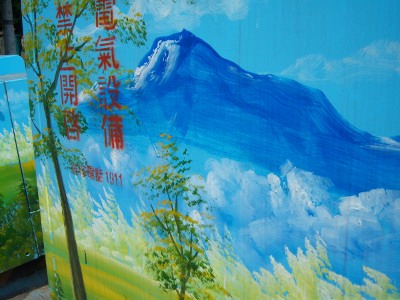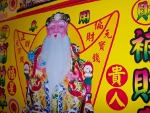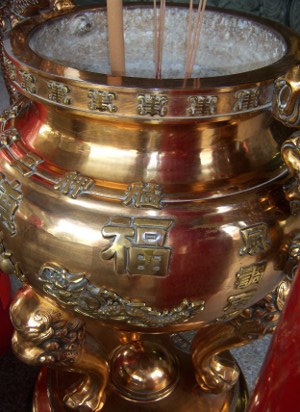- East Asia’s “Post-Confucian” societies
- Chu Hsi (Zhu Xi) emails
- MM as Confucian, Neo-Confucian and Post-Confucian
- Confucianism in 21st-century Chinese academic discourse
APPENDIX 1: Confucius and the Classic Texts
APPENDIX 2: Confucianism in early 20th-century China
Confucianism in academic Chinese discourse
A.
A summary of Chen Lai’s view of ruxue in contemporary China
[Chen Lai is the author of an article called, in English translation, “The Predicament of Ruxue in Twentieth Century Culture” (1988). In John Makeham, Lost Soul: “Confucianism” in Contemporary Chinese Academic Discourse (Cambridge, MA: Harvard U. P., 2008).]
According to Chen, because the “values world” of ruxue did not disappear following the transformation of traditional society, in the socio-cultural transformations of the twentieth century ruxue remained a topic that continually attracted people's attention. Whenever society was in a situation of moral crisis, the calls for a return to traditional values resounded even more loudly. Ruxue values continued to be the focus of attention and to be supported, because morality and modernity became dislocated in the process of modernization. “The continual affirmation of ruxue values during the course of the twentieth century is not, essentially, an expression of so-called postcolonial discourse in China, much less is it the hegemonic discourse of global capitalism or the affirmation of the ideological significance of capitalist modernity.”
Instead, Chen identifies several factors as playing a part in what he portrays as the continued affirmation of ruxue values: the acknowledgement of multicultural values; the belief that ruxue values can provide a therapy for modernity; a deep concern for value rationality (presumably a notion borrowed from Weber), an expression of longing for an ideal life and an ideal human character; a strong demand for identifying with the national culture; and a moral, humanist reflection on the enlightenment narrative.
For Chen, consideration of whether rujia thought still has value should not be influenced by the argument that, historically ruxue depended on certain institutions, such as the chief examination system, for its survival. This is because ruxue had a thousand-year history before the introduction of the civil examination system, and in Japan there was never a civil examination system. “Ruxue is certainly not dead. Since it was broken up and scattered and became a cultural-psychological tradition, unconsciously it has continued to exist in an invisible mode in the culture and in people’s behavior.”
[Makeham goes on to say that “this view, in post-1994 China, has become surprisingly widespread.” However much some might wish to see a dramatic demise of ruxue in China, Chen’s view seems to me sensible. We are hardly at the end of Confucianism in China.]
B.
Cheng Zhongying’s ten principles of New New Confucianism
- To establish an onto-cosmology and a theory of human-life development based on classical ruxue and Song-Ming ruxue
- To establish an epistemology that recognizes the separability and unity of subject and object, as well as a dynamic system of knowledge based on classical ruxue, modern rational philosophy, and science
- To establish a value system incorporating the interaction between reason and human nature, individual and group, based on classical ruxue, Song-Ming ruxue, and modern science
- To develop and continue developing the methodology derived from the mutual entailment of substance and function based on classical ruxue and a comparison of eastern and western cultures
- To integrate the functions and interconnectedness of principle [li], qi [ch’i], mind, and the nature [sic] to form an intellectual strategy that combines knowledge and action based on a synthesis of Song-Ming principle-centered learning and mind-centered learning.
- To establish an ethics of humanity that stresses the combination of rights and responsibilities, morality and utility, based on classical ruxue and modern ethics
- To establish a management structure and system that can be used in public administration and entrepreneurial management based on (i) a synthesis of the experience of ruxue over its previous four stages of development and its modern requirements, and (ii) the lessons learned from the successes and failures of western modernization
- To create economic wealth and its equitable distribution modeled on the spirit of late Qing [Ch’ing] dynasty Gongyang learning and the New New Confucian methodology, outlined under point 4., and based on a synthesis of the development experiences of capitalism and socialism
- To develop and prioritize democracy, the rule of law, and an environment of social advancement and cultural development based on the humanist concerns of classical ruxue and an attentiveness to apprehending the resources of senses, historical experience, cultural spirit and social needs
- To promote education about reason and the humanities so that the values, ethics and methodology of ruxue are able to create ongoing peace and prosperity for humanity based on the ruxue ideals of “the world is a commonwealth” and “great stability throughout the world”
(Makeham, Lost Soul: “Confucianism” in Contemporary Chinese Academic Discourse)
“Confucius was the one who gathered together all that was good. To do this is to open with bells and conclude with jade tubes. To open with bells is to begin in orderly fashion. To begin in an orderly fashion pertains to wisdom while to end in an orderly fashion pertains to sageness. Wisdom is like shooting from beyond a hundred paces. It is due to your strength that the arrow reaches the target, but it is not due to your strength that it hits the mark.”
C.
Guo Qiyong and Mu Nanke on particular and universal Confucianism
In 2002 Guo Qiyong identified a core group of rujia moral values as having transcendent value:
Rujia ethics is [a type of] universalism (pubianzhuyi), but at the same time it is founded on [a type of] particularism and needs to be implemented in the context of concrete ethical situations. . . . Of course, we acknowledge that some of the content of such categories or virtues as humaneness, rightness, honesty, being upright, and justice have transcendent (chaoshikong) and eternal value and meaning. At the same time, we should note that [the import of the teachings of] the rujia and one hundred lineages [baijia] changes as time changes. Thus other specific connotations and meanings borne by the categories of virtues referred to above are also subject to change.
His subsequent comments reveal that the basis for this distinction is an appeal to the co-principles of jing (the constant) and quan (weighing priorities). Indeed, by 2000 Guo’s views on moral particularism were being attacked by Marxist theoreticians. Mu Nanke saw Guo’s defense of the principle of moral particularism as symptomatic of a more general trend in ruxue studies to promote the “universal virtues” of ruxue under the guise of National Studies and Oriental culture.
As a prominent school of learning (xianxue) in Chinese history, ruxue was never a purely academic branch of learning but had extremely close familial ties to the ideology of feudal society. Moreover, it has been internalized as the psycho-spiritual structure of our nation, profoundly affecting the political and cultural life of our nation. This is the reality of ruxue. . . . Accordingly, the critical treatment of ruxue is not merely a principle to be applied in intellectual history; at the same time it is the duty of intellectual historical research. To deviate from this principle or to abandon this task ― instead becoming infatuated with unearthing the so-called transcendent and universal and eternal values of ruxue ― amounts to nothing other than defrauding both history and reality.
Elsewhere Guo provided an example of how the meanings associated with some concepts can and should be transformed. Having first vigorously denied that the recovery and refashioning of the psycho-spiritual (jingshen) resources of ruxue should be regarded as providing a “whitewash” for an authoritarian regime, he showed how key moral concepts such as zhong can be transformed by being invested with new significance. “Promoting the concept of zhong does not necessarily imply that one must be loyal to some political authority. This is because zhong can be given a modern interpretation. For example, in the context of modern entrepreneurial culture or in the construction of our overall national culture [the concept can be] reinvested with concrete modern significance.
(Makeham, Lost Soul: “Confucianism” in Contemporary Chinese Academic Discourse)
“When the Way relies on little accomplishments and words rely on vain show, then we have the rights and wrongs of the Confucians and the Mo-ists. What one calls right the other calls wrong; what one calls wrong the other calls right. But if we want to right their wrongs and wrong their rights, then the best thing is to use clarity.”
Confucius and the Classic Texts




